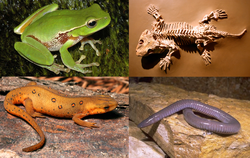What does amphibians mean?
Definitions for amphibians
am·phib·ians
This dictionary definitions page includes all the possible meanings, example usage and translations of the word amphibians.
Did you actually mean amphimixis or ambiance?
Wikipedia
amphibians
Amphibians are four-limbed and ectothermic vertebrates of the class Amphibia. All living amphibians belong to the group Lissamphibia. They inhabit a wide variety of habitats, with most species living within terrestrial, fossorial, arboreal or freshwater aquatic ecosystems. Thus amphibians typically start out as larvae living in water, but some species have developed behavioural adaptations to bypass this. The young generally undergo metamorphosis from larva with gills to an adult air-breathing form with lungs. Amphibians use their skin as a secondary respiratory surface and some small terrestrial salamanders and frogs lack lungs and rely entirely on their skin. They are superficially similar to reptiles like lizards but, along with mammals and birds, reptiles are amniotes and do not require water bodies in which to breed. With their complex reproductive needs and permeable skins, amphibians are often ecological indicators; in recent decades there has been a dramatic decline in amphibian populations for many species around the globe. The earliest amphibians evolved in the Devonian period from sarcopterygian fish with lungs and bony-limbed fins, features that were helpful in adapting to dry land. They diversified and became dominant during the Carboniferous and Permian periods, but were later displaced by reptiles and other vertebrates. The origin of modern amphibians belonging to Lissamphibia, which first appeared during the Early Triassic, around 250 million years ago, has long been contentious. However the emerging consensus is that they likely originated from temnospondyls, the most diverse group of prehistoric amphibians, during the Permian period.The three modern orders of amphibians are Anura (the frogs), Urodela (the salamanders), and Apoda (the caecilians). A fourth group, the Albanerpetontidae, became extinct around 2 million years ago. The number of known amphibian species is approximately 8,000, of which nearly 90% are frogs. The smallest amphibian (and vertebrate) in the world is a frog from New Guinea (Paedophryne amauensis) with a length of just 7.7 mm (0.30 in). The largest living amphibian is the 1.8 m (5 ft 11 in) South China giant salamander (Andrias sligoi), but this is dwarfed by prehistoric temnospondyls such as Mastodonsaurus which could reach up to 6 metres in length. The study of amphibians is called batrachology, while the study of both reptiles and amphibians is called herpetology.
U.S. National Library of Medicine
Amphibians
VERTEBRATES belonging to the class amphibia such as frogs, toads, newts and salamanders that live in a semiaquatic environment.
Numerology
Chaldean Numerology
The numerical value of amphibians in Chaldean Numerology is: 4
Pythagorean Numerology
The numerical value of amphibians in Pythagorean Numerology is: 2
Examples of amphibians in a Sentence
Some 60-70 percent of (amphibians) are in critical danger or almost extinct.
Amphibians are declining so rapidly that scientists are oftentimes describing new species from museum specimens because the animals have already gone extinct in the wild, and very recently.
Birds are in crisis, the take-home message is that our findings add to mounting evidence with other recent studies showing massive declines in insects, amphibians and other taxa, signaling a widespread ecological crisis.
Amphibians, especially certain groups of frogs, produce and store large amounts of antimicrobial peptides in specialized granular glands in the skin, when the skin is injured or the frog is alarmed, they release large amounts of the peptides to protect the skin.
As Pangea split there were huge volcanic eruptions, about 200 million years ago, and these plunged the world into chaos: environmental destruction and rapid climate swings, the big amphibians couldn't cope well and many species went extinct, but dinosaurs and mammals made it through.
Popularity rank by frequency of use
References
Translations for amphibians
From our Multilingual Translation Dictionary
Get even more translations for amphibians »
Translation
Find a translation for the amphibians definition in other languages:
Select another language:
- - Select -
- 简体中文 (Chinese - Simplified)
- 繁體中文 (Chinese - Traditional)
- Español (Spanish)
- Esperanto (Esperanto)
- 日本語 (Japanese)
- Português (Portuguese)
- Deutsch (German)
- العربية (Arabic)
- Français (French)
- Русский (Russian)
- ಕನ್ನಡ (Kannada)
- 한국어 (Korean)
- עברית (Hebrew)
- Gaeilge (Irish)
- Українська (Ukrainian)
- اردو (Urdu)
- Magyar (Hungarian)
- मानक हिन्दी (Hindi)
- Indonesia (Indonesian)
- Italiano (Italian)
- தமிழ் (Tamil)
- Türkçe (Turkish)
- తెలుగు (Telugu)
- ภาษาไทย (Thai)
- Tiếng Việt (Vietnamese)
- Čeština (Czech)
- Polski (Polish)
- Bahasa Indonesia (Indonesian)
- Românește (Romanian)
- Nederlands (Dutch)
- Ελληνικά (Greek)
- Latinum (Latin)
- Svenska (Swedish)
- Dansk (Danish)
- Suomi (Finnish)
- فارسی (Persian)
- ייִדיש (Yiddish)
- հայերեն (Armenian)
- Norsk (Norwegian)
- English (English)
Word of the Day
Would you like us to send you a FREE new word definition delivered to your inbox daily?
Citation
Use the citation below to add this definition to your bibliography:
Style:MLAChicagoAPA
"amphibians." Definitions.net. STANDS4 LLC, 2025. Web. 23 Feb. 2025. <https://www.definitions.net/definition/amphibians>.







Discuss these amphibians definitions with the community:
Report Comment
We're doing our best to make sure our content is useful, accurate and safe.
If by any chance you spot an inappropriate comment while navigating through our website please use this form to let us know, and we'll take care of it shortly.
Attachment
You need to be logged in to favorite.
Log In